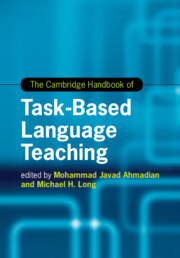Book contents
- The Cambridge Handbook of Task-Based Language Teaching
- Cambridge Handbooks In Language And Linguistics
- The Cambridge Handbook of Task-Based Language Teaching
- Copyright page
- Dedication
- Contents
- Figures
- Tables
- Contributors
- Preface The Origins and Growth of Task-Based Language Teaching
- Part I The Rationale for Task-Based Language Teaching
- Part II Tasks and Needs Analysis
- Part III The Task Syllabus and Materials
- Part IV Methodology and Pedagogy
- Part V Task-Based Language Teaching with School-Age Children
- Part VI The Teacher in Task-Based Language Teaching
- Part VII Task-Based Assessment and Program Evaluation
- Part VIII Research Needs and Future Prospects
- 15 Methodological Approaches to Investigating Task-Based Language Teaching
- 16 Task-Based Language Teaching as an Innovation
- 17 The Adoption of Task-Based Language Teaching in Diverse Contexts
- Conclusion
- Index
- References
15 - Methodological Approaches to Investigating Task-Based Language Teaching
Advances and Challenges
from Part VIII - Research Needs and Future Prospects
Published online by Cambridge University Press: 19 November 2021
- The Cambridge Handbook of Task-Based Language Teaching
- Cambridge Handbooks In Language And Linguistics
- The Cambridge Handbook of Task-Based Language Teaching
- Copyright page
- Dedication
- Contents
- Figures
- Tables
- Contributors
- Preface The Origins and Growth of Task-Based Language Teaching
- Part I The Rationale for Task-Based Language Teaching
- Part II Tasks and Needs Analysis
- Part III The Task Syllabus and Materials
- Part IV Methodology and Pedagogy
- Part V Task-Based Language Teaching with School-Age Children
- Part VI The Teacher in Task-Based Language Teaching
- Part VII Task-Based Assessment and Program Evaluation
- Part VIII Research Needs and Future Prospects
- 15 Methodological Approaches to Investigating Task-Based Language Teaching
- 16 Task-Based Language Teaching as an Innovation
- 17 The Adoption of Task-Based Language Teaching in Diverse Contexts
- Conclusion
- Index
- References
Summary
This chapter provides an overview of key methods that are used to examine the role of tasks in second language performance and development. For each method, I provide a short description of the area(s) of research in which it is typically used, followed by examples to demonstrate how the method can be employed to investigate task-related issues. I also highlight and discuss the advantages and limitations associated with each method, and consider how potential limitations might be mitigated through careful design and implementation. Next, I turn to a discussion of some current issues in task-based language teaching research methodology, such as the tension between internal and ecological validity, the need for more developmental and longitudinal research to complement the current focus on task-based performance, the value of investigating task-based processes besides products, the advantages and challenges of triangulating data sources, and the importance of thorough data reporting and transparency.
Information
- Type
- Chapter
- Information
- The Cambridge Handbook of Task-Based Language Teaching , pp. 605 - 627Publisher: Cambridge University PressPrint publication year: 2021
References
Further Reading
References
Accessibility standard: Unknown
- 2
- Cited by
